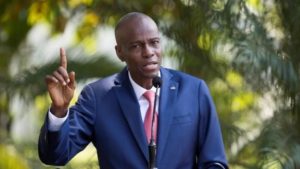Onumba.com — To say that Haiti has had a turbulent history is an epic understatement. 
But while Haiti’s torments and tribulations are well chronicled, it is absolutely important to understand this Caribbean country’s troubled past alongside its historical contributions to the Black race.
It goes way back to the shellacking of France by the colony of Saint Domingue during slavery. In short, this is something, sadly, a lot of Black people do not know, but should, and be thankful for. It was Haiti, yes this poor, little Haiti, that offered a tested blueprint for how to lift the foot of the White man off our collective Black neck.
Riding the spectacular gallantry of the great Toussaint Louverture and his revolutionary comrades, Saint Domingue, part of which later became Haiti (Aiyiti), emerged as the first Black colony in the world to rout a western power en route to gaining national sovereignty in 1804. It was an awe-inspiring accomplishment after an amazing display of military valor on the battlefield. That defeat, not only sent a humiliated France packing, but also became an inspiration for Blacks in gyve across the globe, including American Blacks, fighting for freedom and dignity.
That defeat weakened French influence in the Western hemisphere.
Soon after Haiti’s independence, however, everything went south, and has been that way ever since.
For Haiti, irrational political conflicts and drunken megalomania over power sit at the core of its conundrum going all the way back to the era of the conquering revolutionary icons. After the revolution maestro emperor Jean-Jacques Dessalines, the first leader of independent Haiti, was viciously killed, his body mutilated, dismembered and dragged through the street, all hell broke loose. The ensuing power vacuum caused the two most senior veterans of the revolution, Henri Christophe and Alexandre Petion, to fall out, resulting in Haiti being splintered into two, Christophe controlling the North under the title of Emperor while Petion ruled the South after declaring himself President for Life.
That draconian power grab set the perfect stage for perpetual madness.
After Petion’s death in 1818, Jean-Pierre Boyer took over as President of South Haiti. Shortly after, Christophe in the North died, allowing Boyer to amalgamate both the North and South as Haiti once again.
Boyer, now president of a united Haiti, continued and successfully wrapped up a negotiation Petion had started with France concerning the status of the new nation. But those talks resulted in a god-awful deal. It required Haiti to compensate France a total of 150 million Francs ($21 billion in today’s value) for lost revenues suffered as a result of colonists no longer profiting from their human commodities —– the Haitian slaves. Yep, you read that right. In other words, enslaved Africans signed a deal which forced them to compensate their French slave masters for being enslaved. The reverse would have made a lot of sense, wouldn’t it? Truth be told, it wasn’t the deal Boyer had hoped to achieve. He was wedged between the rock and a hard place which left him with lousy options. The president was essentially forced into agreeing to the deal in exchange for securing the elusive French recognition of Haiti’s independence or risk renewed war with France and possible reintroduction of slavery.
That atrocious deal, that inter-generational economic albatross, that White supremacist, that cold-blooded heist, became the absolute linchpin of Haiti’s multilayered woes till today. Haiti spent eons paying an unjust debt it could not afford. It was paid off in 1947. 
But then rapacious quest for power by Haitian elites hasn’t helped matters either, and that along with everything else, has been behind Haiti being in a perpetual state of social and political tinderbox. In short, Haiti’s past is littered with social tumult and political instability, a depressing cascade of coups and counter coups, many of them bitter, brutal, bloody and brazen.
The recent coup was no different.
The ghastly assassination of the 53-year old President Jovenel Moise on July 7 is yet another depressing saga for Haiti, a country branded the poorest in the western hemisphere and was recently dangling on the edge of political cacophony over elections, including growing challenge to Moise’s duration in office.
Haitian police are on it. They have nabbed 19 suspects, 17 of them described as mercenaries recruited out of Colombia by the alleged mastermind of the attack —- Christian Emmanuel Sanon —- a Haitian American doctor and evangelical pastor from Florida.
It appears Sanon reportedly orchestrated the coup to become president himself.
Well, that is not going to happen.
The 63 year old Sanon has been arrested and now in more hot water than a Chinese tea bag. Back in Florida though, those close to him, including his brother, Charles, emphatically deny his involvement in the attack, believing instead he was “duped” and “setup.”
Sanon himself maintains his innocence. He is yet to be charged with any crime.
Of course, everyone is innocent until proven guilty, that goes without saying, but can anyone convincingly explain just what in the world Sanon was up to when he visited Haiti weeks ahead of the attack?
True, like everyone else, he had the right to visit Haiti. But not the way he did.
According to Haiti’s National Police Chief Leon Charles, the alleged would-be president for some reason popped up in Haiti just weeks before the assassination, arriving in a private jet accompanied by a coffle of bodyguards, many of whom reportedly took part in killing Moise.
Two of the suspects are reportedly American citizens who now claim their role in the assassination was limited to language interpretation.
Moise’s wife, Martine, was with her husband when the attackers stormed their home. She sustained injuries to the hand and thigh and rushed to a local hospital before being flown to a Florida hospital where she received treatment and expected to fully recover. She is now back in Haiti.
“In the blink of an eye, the mercenaries entered my home and riddled my husband with bullets,” she said in her first public reaction to the assassination of her husband.
“I am alive but I have lost my husband Jovenel.”
The assassination has plunged Haiti into political imbroglio, unleashing a simmering stew of economic morose, insecurity and COVID-19 crises which could boil over, even as a bruising brawl for power looms.
Meanwhile, the interim Prime minister Claude Joseph, citing need to stem the country’s tumble into “chaos,” assumed leadership of the country and declared a “state of siege.”
Joseph has also sought “investigative and security” assistance from the United States, including troops deployment.
But the Biden administration has said the United States will not send troops to Haiti, though government officials are working with the Haitian authorities involving the assassination.
Investigation into the assassination is ongoing. How long Joseph serves as president remains unclear as the future of this Black country of over 11 million hangs in the balance.






